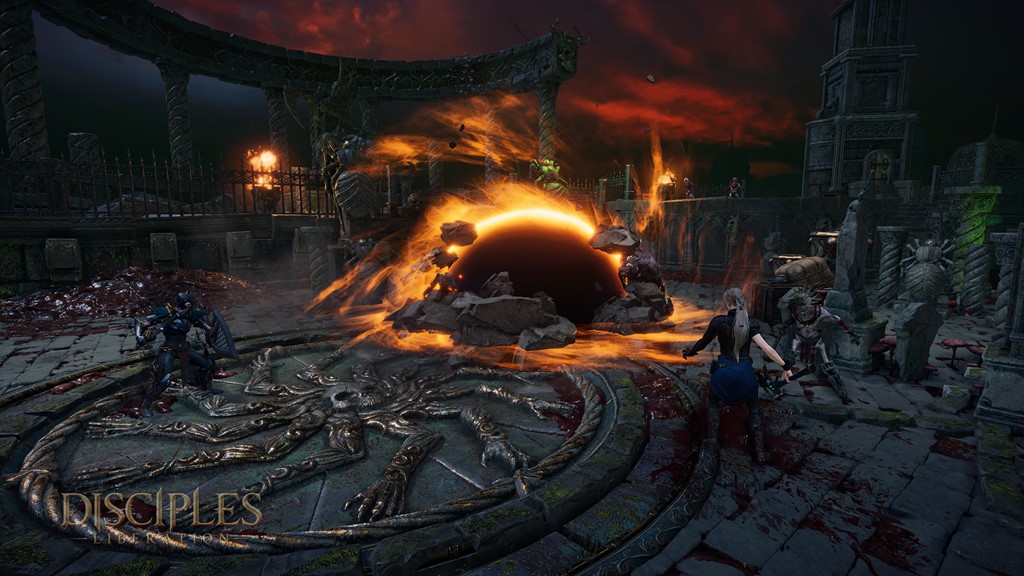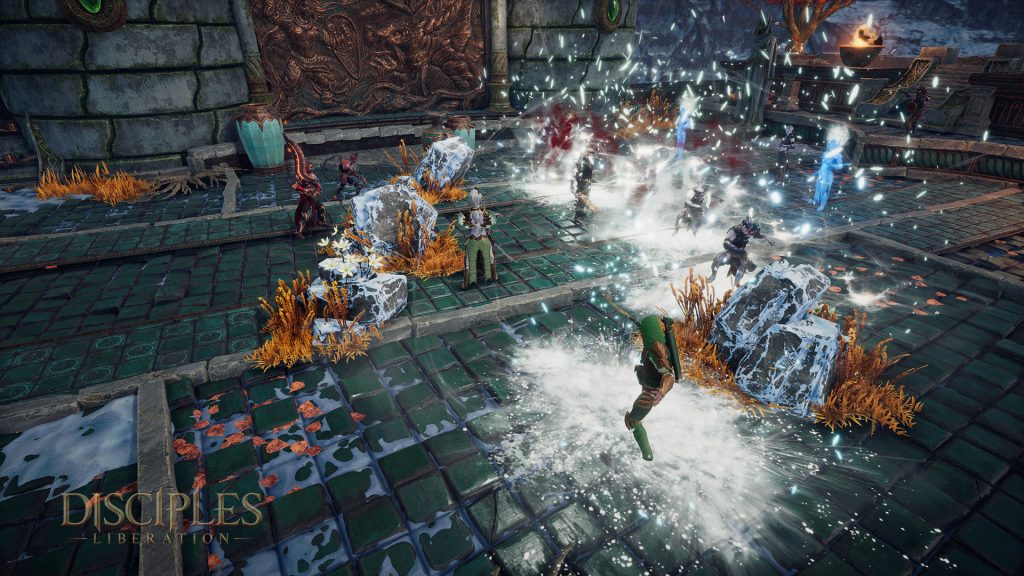Much is often made of games that feature moral choices and ask you to think about the consequences of your actions. For the most part, these games turn out to be mostly smoke and mirrors; while they offer choices that matter on the surface, those choices are ultimately revealed to be hollow, changing very little about the overall narrative or direction of the game. Disciples: Liberation is a new RPG in the Disciples series that purports to offer serious, weighted moral choices amid a deep turn-based strategy combat system, but can it succeed?
Disciples: Liberation tells the story of Avyanna, who, along with her best friend Orion, takes part in a botched assassination attempt early on in the narrative. Fleeing from the watchful gaze of the Empire, Avyanna and Orion find themselves in the city of Yllian, which Avy decides she’s going to use as a base from which to strike back and make a name for herself. What follows is a somewhat picaresque story in which Avy and Ori must forge alliances with some of the world of Nevendaar’s disparate factions; you’re somewhat free to choose the order in which you do so, too.
It’s a little difficult to get a foothold in the story of Disciples: Liberation. There’s a sense that there are parts missing from Avy and Ori’s journey; an introductory sequence showing who they are and what they’re about wouldn’t have gone amiss, as the game doesn’t really set up their characters adequately, meaning you’re just left to figure things out as you go. Environmental storytelling and background details should pick up the slack, but the fact is that Liberation often feels like it’s a core experience in search of a meatier narrative background to help establish some basic concepts.
Happily, that problem doesn’t extend to the writing and general storytelling in Liberation. Things don’t start out well, but it’s not long before Avy is having to make some pretty knotty choices, some of which might affect her standing with certain factions. Balancing the approval of all the races and organisations of Nevendaar is the name of the game here, and it’s just as difficult as you might expect. Decisions might hurt your standing with a faction or upset one of your companions, which never feels fun; it’s one thing to see a morality meter tick down, but quite another to annoy someone you’ve been travelling with for a handful of hours.
Disciples: Liberation doesn’t have a conventional morality system, which comes as a breath of fresh air. The world it’s trying to present is ambiguous and complex; sure, the elves are murderous xenophobes, but they’re trying to protect and preserve a fragile culture, and even the demons aren’t all bad. Choices don’t reduce or raise your standing on some arbitrary meter; instead, they feel weighted and involved, which is testament to the quality of the writing on display in Disciples: Liberation. Existing in this world and making the choices it demands of you feels appropriately difficult.
Unfortunately, the phrase “appropriately difficult” doesn’t belong anywhere near the core combat in this game. Battles are a grid-based, turn-based affair in which you must order troops in both your Frontline and Backline. Frontline troops are capable of attacking, while Backline troops can provide support, so it’s a question of balancing these two aspects of your forces and making sure you’re managing them correctly. Enemies also utilise this system, so you’ll need to take enemy backline strategies into account when you’re forging your own combat tactics.
The early part of Disciples: Liberation is when the game is at its most difficult (and therefore its most interesting). When you don’t have access to a large army or a lot of companions, you need to make tactical decisions carefully, with a view to minimising casualties and making things as easy for yourself as possible. Later on, though, you can simply overwhelm the enemy with numbers, making for a lot of drawn-out, tedious fights during which you’ll be hammering buttons and trying to skip animations. That is until a story mission will suddenly spike the difficulty, leading to a slaughter for which you couldn’t possibly have prepared.
The story is involving enough to keep things moving, but the combat can’t sustain itself across all of Disciples: Liberation’s run time. Enemy AI isn’t particularly clever, but it has admirable self-preservation instincts, meaning that wounded enemies will often draw out fights for far longer than they need to go on. The new Conquer system bears some resemblance to classic JRPG EarthBound; if a battle is all but won, you can simply press a button to resolve the battle, granting you experience and gold without putting you through the needless tedium of engaging in the fight.
There’s also a base-building element to Disciples: Liberation, but it feels a touch underused. It won’t take you long to construct all of the elements you’ll need for a full playthrough in your base, and once that’s done, the base-building aspect doesn’t feel like it ever justifies itself again. It just feels like another interruption to the turn-based combat and moral choice systems that are the true beating heart of Disciples: Liberation. This is a game that feels like it’s tied itself in knots wanting to have extra systems, when it would have fared better if it had stuck to its guns.
All in all, there’s a lot to like about Disciples: Liberation. It’s by no means a bad game; fans of turn-based combat experiences like XCOM or Gears Tactics will find plenty to love here, and if you’re a huge fan of CRPGs with knotty moral choice elements like Wasteland 3, there’s a lot to like. It’s undeniably shonky; some of the voice acting is weak, and there are a few bugs that need ironing out. However, there’s plenty to keep you occupied if you love any of the things Disciples: Liberation is good at, so make sure to check this one out if you want to occupy a week or so.
This post didnt have a specific author and was published by PS4 Home.



